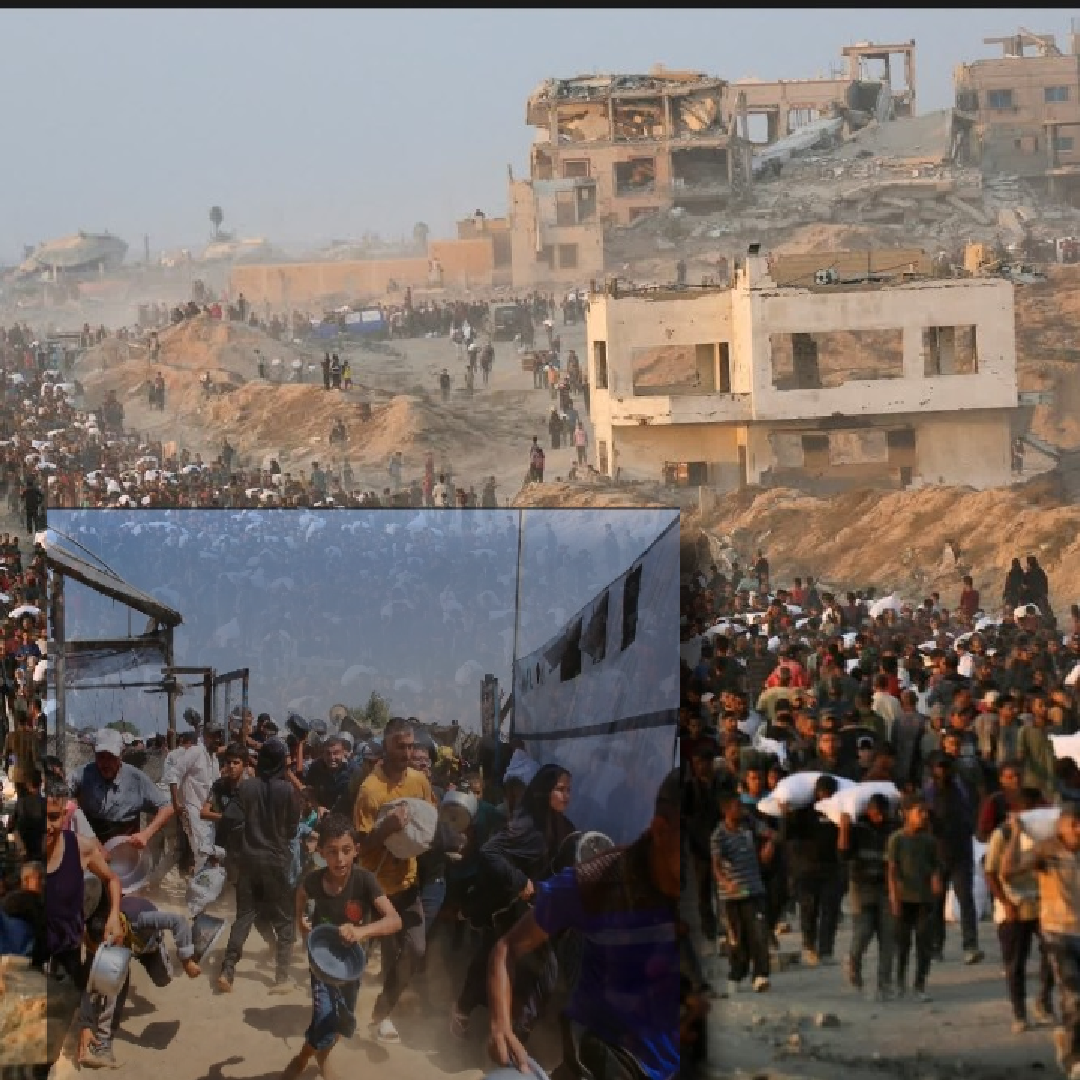The Humanitarian Catastrophe in Gaza: When Silence Speaks Louder Than Words
Gaza’s catastrophe is not only measured in staggering statistics, but in starved children, darkened hospitals, and a world whose silence deepens the suffering.

The humanitarian crisis in Gaza is a catastrophe in every sense of what a conscientious mind can think of, which aptly exposes the racist tendencies, extreme hostility, and the brute nature of Zionism. The deafening silence of the Western powers may call for scrutiny of their claims of democracy, justice, and being champions of human rights. It also disclosed the weakness of the UN Security Council globally.
The situation in Gaza has been bleak, with staggering numbers of almost 2 million people displaced (roughly 83 percent of Gaza's population). An interview from the UN Human Rights Office of the High Commissioner in January 2024, suggested over 25,000 lost lives and 65,000 injuries, with several thousand unaccounted for under the rubble.
In 2025, within one week (between 16 July and 23), Israel killed 7646 Palestinians and wounded 3,438 others. Similarly, in the last five months since the re-escalation of hostilities from 18 March 2025, 8,363 Gazans have been killed while 31,004 have been injured.
From October 2023 to July 2025, Israeli Forces have directly killed at least 59,219 Palestinians, injured 143,045 others, and unfairly detained over 6,000 more, which is the highest since 2005 when the UN started documenting such figures on record.
Hospitals and medical facilities have also been attacked, with very few still functioning. According to the WHO, more than 10,000 patients in Gaza require medical evacuation overseas, mostly children.
Day in and day out, the Israeli Defense Forces (IDF) bombardments are getting relentless, making the existing shelters and clinics cramped and accompanied by disastrous sanitary conditions. As the situation deteriorates, the images of starved or malnourished individuals (and children), a corridor of a darkened hospital, or a family clinging to a single plastic jug become commonplace.
Basic lifelines have frayed to the point of collapse, while fuel, the mundane commodity that powers hospitals, water pumps, and bakeries, has become a scarce and priceless resource. This led to failure in generators, silence in surgery rooms, and a stoppage in oxygen supplies.
Following all these, critical questions may flash into one's mind, such as:
1. Why is the so-called civilized world that claims to be the champion of human rights turning a blind eye to the humanitarian catastrophe in Palestine?
2. Is there nothing the world superpowers can do about it?
In Gaza, such questions have been answered too often by an eerie silence, muted corridors of diplomacy, delayed convoys, and the grinding normality of shortages that become a daily death sentence to all Palestinians.
International health and humanitarian agencies have repeatedly warned that without sustained access to fuel and supplies, lifesaving services in Gaza will stop. The technical description is “clinical,” and the human description is devastatingly simple: “When supplies stop, people die.”
The catastrophe unfolding in Gaza is not only measured in statistics but also in the shrieks of ambulances that no longer run, in incubators that go dark, and in the slow withering of childhoods (of innocent children) before they can even take a single step.
Despite the global public outcry, the humanitarian crisis is met with deafening silence, willful ignorance, and or a creeping acceptance of political bias. The USA, UK, and the EU need to be united in leveraging the power at their disposal for global peace, justice, and true democracy, including active support of the Israeli and Palestinian civil societies.
The Violence of Silence
When an entire population is deprived of the basic needs that keep people alive, the moral question is immediate and unambiguous. When the political history of a conflict is long and complex, there's no need for an appeal to take sides but only a plea that rises above politics and primarily focuses on humanity.
Displacement in Gaza has turned entire neighborhoods into a maze of makeshift shelters and overcrowded schools. Families are forced into tents and cramped public buildings that lack basic sanitation, privacy, and protection. And yet, amid these cascading crises, there is another kind of violence, “the violence of silence.”
Silence here is not a mere “absence of voice” but rather an “absence of urgency,” where “statements” replace “action” and “press releases” become substitutes for “life-saving corridors” for humanitarian aid. In Gaza, the logistics alone, such as a convoy, a permit, or refueling, are often the “difference” between life and death.
International organizations continue to call for unimpeded humanitarian access, but words alone cannot refill a fuel tank, reopen a neonatal ward, or restore power to a hospital. For humanitarian workers on the ground, the task is not merely to deliver aid but to do so in conditions where routes are safe, supplies are adequate, and the dignity of recipients is not constantly eroded.
Hunger, Starvation, and Child Abuse
Many families in Gaza are surviving miserably while living in constant fear and moving from one shelter to another, making their children more vulnerable. Reports from relief agencies show dramatic increases in malnutrition and a surge in families unable to secure a single full meal a day.
According to the Gaza Ministry of Health, as of May 2025, 1,060 people have died and 7,207 others sustained injuries trying to access food supplies. UNICEF's Executive Director, Catherine Russell, also in her briefing to the UN Security Council on July 16, stated that more than 17,000 Palestinian children were killed in the last 21 months, while 33,000 children sustained different types of injuries.
Over one million children are currently bearing the brunt of deepening starvation and malnutrition in Gaza, with several cases of death occurring every day. Annually, there are nearly 71,000 cases of acute malnutrition among children in Gaza aged 6 to 59 months. 14,100 severe cases are also expected between April 2025 and March 2026.
When the situation worsens, families living on one meal a day are simply among the lucky. Sadly, starving kids, sometimes as many as 100, can be seen in a stampede running towards food carts. Children as young as four are also seen lurking, sometimes carrying water in Jerry cans or chopping wood for fire.
These malnourished children are not just statistics but upcoming individuals whose future is shortened, minds and bodies denied the nutrition needed to survive and learn. They have not gone to school in months/years because their schools and universities have been utterly destroyed.
UN agencies have raised the alarm that many of these children are so weakened that further displacement or escalation could be fatal to their survival.
International Law and Human Rights Violations
UN agencies, human rights organizations, international law experts, and Holocaust researchers have all agreed that what is happening in Gaza, at the very least, is a full-blown human rights abuse, a violation of international law, and a war crime.
Dr. Imme Scholz, in her article “As Gaza is devastated, so is international law,” reiterated that “the destruction of Gaza is not only a humanitarian catastrophe but also a violation of international law. With the looming expulsion of Palestinians, the violence will only escalate further.” According to her, if Germany and the EU continue to look the other way and allow killings and displacement, they are betraying international law and universal human rights.
The Israeli act of breaking the ceasefire agreement on 18 March 2025, and bulldozing the last remaining buildings continued to leave Gaza in ruins. Sadly, even Gaza Humanitarian Foundation (GHF) operators often find themselves under fire every time they dare to approach the remaining few of their distribution points for humanitarian assistance.
As of July 2025, there's also a plan by the Israeli government to confine up to 600,000 Palestinians on the ruins of Rafah. According to the Israeli Defense Minister, Israel Katz, only Gazans who pass a security screening will be allowed access to the so-called “humanitarian city.”
Citizens who are allowed will also not be permitted to leave the “city” except that they're leaving for other countries. Unfortunately, a significant number of Palestinians may be willing to accept this arrangement due to their weakened and desperate situation.
Urgent Action: As Actions Speak Louder Than Words
The duty to act does not evaporate because the situation is difficult. If anything, it grows more intense, especially as demanded by humanitarian law and basic human decency.
To break this silence, practical steps matter. Steps in the sense of safe and sustained access for guaranteed humanitarian supplies in terms of food, fuel, and water infrastructure. More importantly, it should be followed by diplomatic pressure that translates into concrete actions geared towards a ceasefire, civilian protection, and the security of humanitarian workers.
Pressure groups, humanistic journalism, and policymaking that prioritizes saving lives over rhetoric are equally important. When words are finally matched by actions, the headlines will not be enough to undo the harm, but action can stop further catastrophe.
Silence has an ethical weight! It condones inaction and sanctions. If we hear the cries from Gaza and respond only with statements, we become complicit in the slow attrition of human life. If instead we marshal the will to deliver aid, protect hospitals, and secure water and fuel, we affirm a universal principle that some “human needs” transcend “politics,” some children deserve to be fed, and ruined hospitals are in a state of emergency we cannot ignore.
The choice, as stark as it is, asks us to translate empathy into mechanisms and relentless attention to the human story behind every report. In Gaza, silence speaks loudly, but it does not have to be the final word that defines the whole situation.



Comments ()